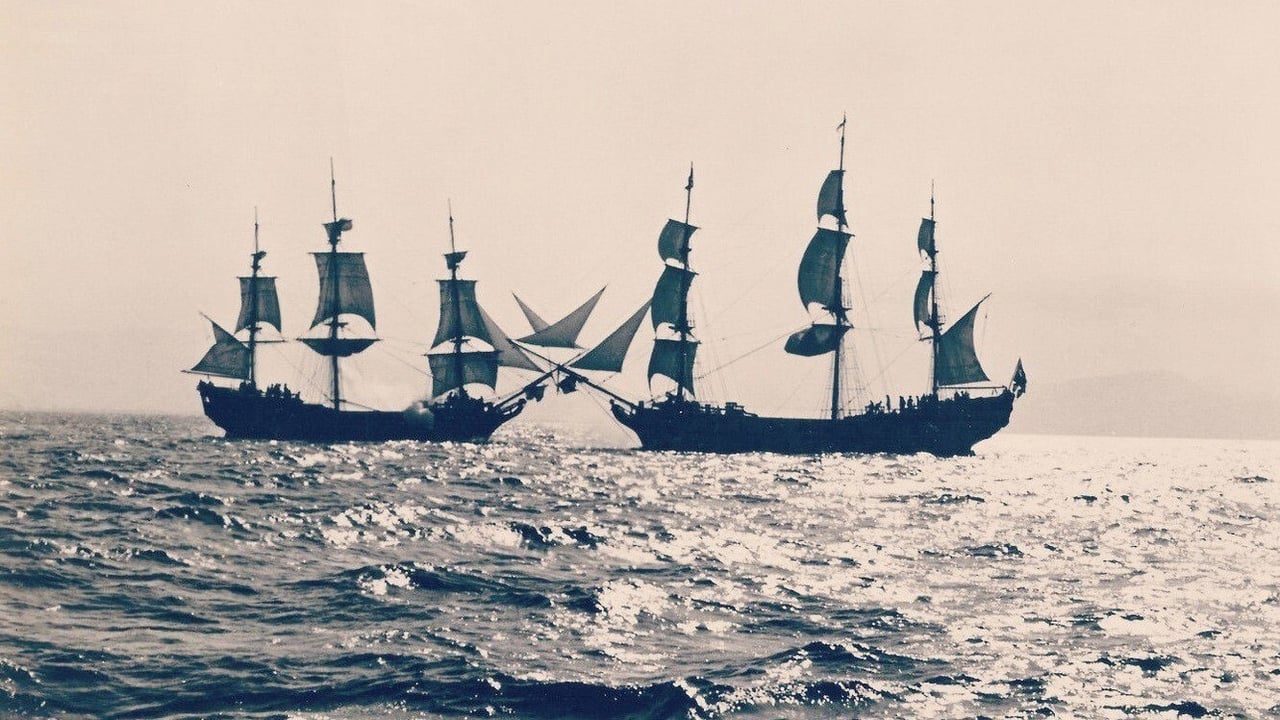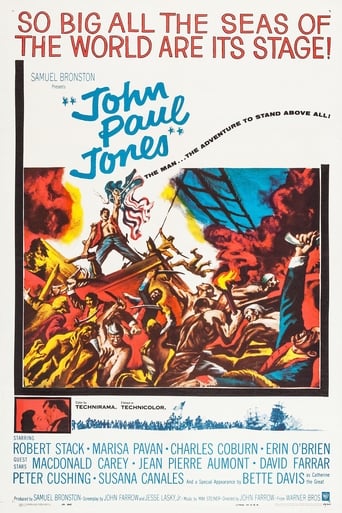Ensofter
Overrated and overhyped
Softwing
Most undeservingly overhyped movie of all time??
MamaGravity
good back-story, and good acting
Ketrivie
It isn't all that great, actually. Really cheesy and very predicable of how certain scenes are gonna turn play out. However, I guess that's the charm of it all, because I would consider this one of my guilty pleasures.
kitablett-05623
And so ended Robert Stack's movie career. This turgid thing has to be one of the most boring movies I've ever had the misfortune to watch. John Farrow, the director of this awful movie, should have been ashamed of himself. The actors all look either bored or at a loss as how portray their parts, especially Robert Stack ,whom has never been more wooden in his whole career. The photography, despite the beautiful locations, is totally static and there seemed to be little editing or close-ups in the whole film. The audience of the day must have longed for the heyday of Errol Flynn in movies like "Captain Blood" and "The Adventures of Robin Hood" when they watched this turkey. An actual action scene does take place about 95 minutes into the movie, but it's much too little , too late. It's sort of like a bad school history lesson, which I remember so well. Charles Coburn is a welcome participant as is Bette Davis at the end , although the scene she appears in, with the "bring on the dancing girls, if all else fails" routine, is unintentionally funny. Even the usual brilliant Technicolor has a brown cast to it which makes the colour in the film seem annoying for the most part. If you want to spend over two hours being bored, do watch this film.
lord woodburry
In The Revolution only one man attacked British merchant shipping so fierce that the Llyod's Company begged King George to let America go. That same man attacked a British installation in the West Indies and conducted the only foreign incursion on British soil in a millennium. Such a character must have captured taken Hollywood by storm.Billed as the "true" story of John Paul Jones, John Paul Jones offers for Hollywood an accurate summary of the dynamic naval hero's life.Though larger than life, Jones born John Paul stood 5'6" tall, hardly NBA material today but in his time perhaps average. Size was hardly the only obstacle Jones had to overcome. Not favored by birth into a poor Scottish Clan during occupation by Red Coats. John Paul at age 14 goes to sea as ship's boy.Rising to wealth in the West Indies, John Paul (Robert Stack) kills a mutinous crewman. The British magistrate offers friendly advise: flee to America rather than face an Admiralty Court. In Virginia, Jones finds America seething with resentment toward the Redcoats and veering into revolution.When Revolution explodes, Jones accepts a commission. His mission to raid a British fortification in the West Indies brings needed gunpowder to the American cause. In his next command, Jones takes 18 British vessels. Despite all the prizes, the Continental Congress lands Jones at the bottom of their list of naval commanders.Robert Stack's stately appearance and mellifluous voice carry the air of command, even if they do not capture a Scottish burr. Stack plays Jones as the committed hero, unshakable in battle, despite a justifiably anger at the ingratitude Congress would show almost all its talented land and sea commanders.Yet despite the rage General George Washington (Jack Crawford) persuades Jones to return to sea to break the British blockade. Jones promises to steal the derelict Ranger docked at Portsmouth, refit it, raise a crew, and set to sea.On the briny, the French greet The Ranger (according to the movie) with the first salute given to the flag of the United States. History usually gives the honour of the first salute to US colors to the Dutch at St. Eustis.Rushing to Doctor Franklin (Charles Coburn), Jones has a plan to invade the British Isles with a tiny ship. While distracting the entire British Navy with incursions and raids, Jones will force insurance rates to skyrocket. Although the mission was successful, a disgruntled crewman's charges lead to the relief of Jones. Ranger is withdrawn to America. High and Dry in France with only the comfort of his beloved aimee, Aimee Jones regrets his inability to build an American Navy above politics and privateering.Although the King of France cannot provide a ship for Jones, the Queen privately invests in the Bon Homme Richard named after Franklin's "Poor Richard's Almanac." Asea under the American flag, meets the HMS Serapis in an attack so fierce that the two ships are grappled together and firing point blank. Refusing to surrender, Jones declares the famous words, "I have not yet begun to fight." The British surrender just in time for the Americans to transfer to the captured vessel before the good ship Bonhomme flounders.First in war and first asea, Jones finishes last in love. Despite honors and acclaim Jone's girl Aimee is of the blood Royal who cannot marry a commoner. Peace brings a let down. The young republic cannot afford a naval fleet with competent seamen. The Real life Jones warned accurately of future trouble with the Barbary coast.The new Republic would pay dearly ($2000 per seaman captured by barbary pirates) for ignoring Jone's prophesy.Jones departed for Russia to accept a commission as rear admiral in the Czarist Imperial Navy from Catherine the Great (Bette Davis). In the movie, Jones is on assignment from the US government to study the building of a real navy; in reality Jones was out of work and needed a job. While the Empress is less interested in war than playthings, Jones prefers the sea and his command.The real life Jones found the Czarina's navy in worse shape than the American Navy with conscripted serfs unable at seamanship. Jone's reports resulted in trumped up charges. Luckily Jones was permitted to leave for France.The movie version is kinder to the Russians. Despite constant interference and poor ships, Jones has won great battles in the Black Sea for the czarina. However, Jones has fallen critically ill.On return from Russia, Jones is attended by Franklin and Aimee. In real life Jones died alone. Franklin had departed for America long before.Jones probably would have enjoyed the uniqueness of his burial: the first unnoticed almost without ceremony in the foreign cemetery in Paris seething with its own revolution. The remains would probably have crumbled into dust except that an American consular official thought that America might wake up sometime in the future and recall its hero home. The body was placed in a leadened coffin.In 1906 the US emerging as a superpower located the grave now under a Paris street and dis-interned Jones for reburial in the chapel at Annapolis, Md. All the pomp lacking in 1792 was found over 100 years later.
Jeffrey Pease
Just a question; where was JPJ filmed? (I'm looking for ALL locations)and does the movie archive keep a list of unnamed and uncredited extras who appeared (in the backdrop) of the film? My folks have had a replica of the Declaration of Independence in our living room that they say was a souvenir given to people (i.e. my uncle) who were hired by the producers as extras. He said that he was a signer of the document. He and my aunt also kept a copy in their house. It's been awhile since I've seen the movie, but I will look more closely next time to see if I recognize him. My uncle wasn't an actor, but a military man (retired, I think, by that time). He had to have been in the right place at the right time to be chosen as an extra. I'd love to have more info. Jeff
Paladin-13
Essentially a biography in movie format, tells of the life of John Paul Jones, the man who put the U.S. Navy on the map during the American Revolution. It touches briefly on his early life, concentrating on his life in the colonies and what led him to go there after a career in the King's service. Movie also touches on the impact and standards that Jones imprinted on today's navy, and it is this element, among others, that makes this well worth watching. Stack (although taller than Jones's height of 5'4") is perfectly cast in the title role. Not to be overlooked either are Coburn's portrayal of Benjamin Franklin, Davis's of Catherine the Great, and Max Steiner's excellent musical score. Additional note: movie was produced by Samuel Bronston, who also produced and did a magnificent job on "El Cid." Whether one is looking for a movie about the Age Of Sail period or simply wants to learn about Jones, this is an excellent choice.

